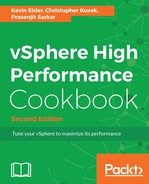When there are multiple VMs running on the same hypervisor, most of the time some of them might have identical sets of memory content (known as memory pages). This creates opportunities for sharing memory across VMs. The ESXi hypervisor can reclaim redundant copies and keep only one copy using TPS. You can think of it as Memory Deduplication.
Traditionally, in x86 systems, memory is split into 4 kilobytes of pages, and that happens only if you are using small pages with shadow page tables. The TPS process runs every 60 minutes. It scans all the memory pages and calculates a hash value for each one of them. These hashes are saved in a separate table and compared to each other by the kernel. Every time the ESXi kernel finds two identical hashes, it starts a bit-by-bit comparison of the corresponding memory pages. If these pages are absolutely the same, the kernel leaves only one copy of the page in memory and removes the second one. When one of your VM requests to write to this page, the kernel creates a new page because the change made by one VM must not affect the memory contents of another VM.
VMware ESXi scans the guest physical pages randomly, with a base scan rate specified by Mem.ShareScanTime. The maximum number of scanned pages per second in the host and the maximum number of per-VM-scanned pages (that is, Mem.ShareScanGHz and Mem.ShareRateMax, respectively) can also be specified in ESXi's advanced settings.
